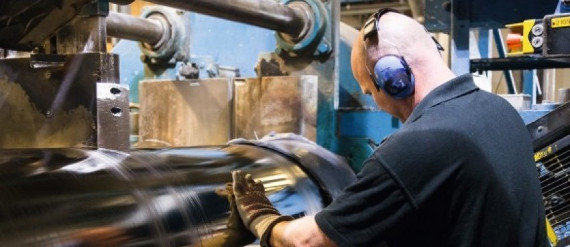The alumni interviews: MET over lunch

Jonathan is currently CEO of Amtico, a design-led flooring manufacturer. In 2003 he invested in a management buyout of the company and then led a secondary buyout in 2006. In 2012 he sold Amtico to the US company, Mannington Mills.
After graduating from PET, Jonathan became a management consultant, first with the Boston Consulting Group and then McKinsey. He then went to Bass PLC, where he was Divisional Director running various drinks, gaming and retailing business units before becoming the CEO of Access Self Storage, a private equity-backed property company.
Jonathan also has an MBA from Harvard Business School.
He was talking about PET and how it has influenced his career to Dr Ronan Daly, head of the IfM’s Fluids in Advanced Manufacturing Group and a lecturer on today’s MET course.
 |
|
Jonathan Duck, CEO, Amtico |
What made you choose PET?
I think I was quite unusual in that when I applied I already knew that I wanted to do a ‘Monty Finniston’ course. Sir Monty Finniston was Chairman of British Steel and he had been asked to head up a committee addressing the UK’s shortage of qualified engineers. His point was that the country needed engineers who understood business and he recommended that universities should offer much broader, business-based engineering courses – which is what PET was. This seemed a very sensible approach and I had this confirmed when I arrived by friends in the years above who told me what good fun PET was proving to be. They were still doing some numbers and applied maths but they were also doing lots of other things which I felt would be a much better training for business than just following the pure engineering route.
I gather that you had to have some experience of using workshop tools before you started?
It used to be the case that you couldn’t do Part IA unless you had done four weeks in an apprentice training school learning how to weld and use a lathe and so on. You also had to spend something like eight weeks on the shop floor. It was very useful to do that before starting university because once you are on a course or have graduated you are known as ‘the student’. But if you turn up when you are 17 or 18 you are just mucking in with everyone else and you see the factory from the perspective of the shop floor – and that is a very different view of what’s going on than the one management has. You only have that opportunity once. It also teaches you some other very valuable lessons such as that just because you’ve been to university doesn’t make you any cleverer than people who haven’t and some of the most astute people you meet are on the shop floor. When I was doing my apprentice training at Kodak we were asked to explain how an SLR camera worked. The task was given to one of my fellow apprentices who had left school at 15 and he was absolutely brilliant. He knew much more about it than I did or any of the rest of us who had done physics A- and S-levels.
Was it always the business side of manufacturing that you were interested in?
Yes, the bits I found most interesting were microeconomics, the theory of the firm. But the course was incredibly varied. We did some employment law and went off to a couple of industrial tribunals. We also learned about organisational behaviour decision-making and corporate finance. And this was all being taught to us at a reasonably advanced level. When I went to Harvard Business School, I was pleasantly surprised to find I’d already done quite a lot of the syllabus. We were also given the option of taking the Certified Diploma in Accounting and Finance which about half of us did because it was useful to understand the basics of inventory and management accounting and I still find myself using all that now. Again, that seemed to cover about half the first year finance syllabus at Harvard. PET gave us a very good general business grounding.
Cambridge always has this reputation of being about questioning, trying to understand what’s really going on.
What about the production engineering aspect of the course?
We did all that stuff about debottlenecking and reducing cycle times. People talk about lean manufacturing now but it’s really just a packaged up version of what we learnt here. Mike Gregory had a session once a week where he would hand out, say, a set of plugs and a hammer to smash them up with. You had to work out how they had been made – which bit was cast, which was forged, which was stamped, why they were made from a particular sort of plastic. And you might have an expensive plug and a cheap plug and have to work out how costs had been saved on the cheap one. It is very useful to understand how and why something has been made in a certain way.
The production engineering side of the course definitely gave me the knowledge to do the practical stuff when I need to – and also to know when to get someone else in! I sometimes wander around Amtico late in the evening and there may be a problem with the process machinery. I don’t understand the machine in any detail but I know enough to identify the likely source of the problem.
What about student projects? Were they useful?
Ours was developing an industrial hoist. The idea was that you set up your own company and as well as doing the design you had to come up with all your profit and loss, balance sheet and crucially, cash flow forecasts. And this was awkward because we didn’t have software in those days so I had several bits of A3 stuck together with the numbers on them and if someone changed an assumption in Month One I had to cascade it through my spreadsheet and work it out‘by hand’.
But this whole experience of pitching for finance, structuring a business plan and making sure you would get a return on your equity investment turned into something I revisited when I borrowed money from banks and private equity to do management buyouts. I’ve now done this three times and a lot of the basic principles came out of my PET student project.
When you are recruiting graduates, what are the things you are looking for?
Cambridge always has this reputation of being about questioning, trying to understand what’s really going on. There’s a certain independence and free spirit of thinking that gets honed on this course. When recruiting you want people who will challenge the status quo. I suppose in a way just going down your regular engineering course is following a path – doing PET is a little bit different so the people coming out of it are a little bit different. When I was working for the Boston Consulting Group and McKinsey and doing regular undergraduate recruitment we would go out of our way to look for people coming out of MET. For one thing, they had graduated the previous year so you knew what class of degree they had got and, secondly, they had already had a go at working on student projects so they had been ‘housetrained’ around what you do and what you don’t do when you get deposited in a company. They already had the ability to diagnose and make recommendations within a two to three week time frame. Quite honestly, it gave them an unfair advantage.
At least once a week you would laugh until you cried.
I get the impression that you quite enjoyed the course…? The first two years of the engineering degree was all lectures and rather theoretical. The PET course was an enormous amount of fun. Partly because it’s a bit like having away matches in sports teams – you are off doing your industrial projects, staying in dubious hotels, working in companies with all sorts of problems but you are doing it with your fellow students and you get really close to them and that meant it was a very, very enjoyable couple of years. At least once a week you would laugh until you cried. And you pick up very quickly with your old mates when you see them again. We all stay in touch.
This course has had a very profound effect on what I’ve done in the rest of my life in ways I would not have expected.
 |
How did you end up at Amtico?
It came around at the right time. I was looking for a business which could be improved and it was around the time people were starting to talk about rebalancing the UK industrial economy. But that was something that Mike had already drummed into us on PET: how vital manufacturing is to a national economy. So my role at Amtico has been twofold: first, the simple task of making a business better and, second, trying to rebalance my little part of the West Midlands economy, to actually export something and to compete with Chinese manufacturing. Which I’m pleased to say we’ve been able to do.
We were reshoring seven or eight years ago before it became fashionable and since then we have been able to steadily increase the number of jobs both in our US and UK factories. That is a really important part of what we do. And the process has been an interesting example of PET principles – you can compete with the Far East if you think about what you are doing. Not long after I arrived I introduced a new product line which I decided to make in China. This meant we were able to see what the Chinese were doing and adopt their best ideas when we brought the production back. A lot of what I learnt about production on PET came in very useful and certainly helped us to get down to the Chinese cost position
.
How important has PET been in your career?
This course has had a very profound effect on what I’ve done in the rest of my life in ways I would not have expected. I’m convinced that Amtico could have gone backwards and given up all its manufacturing. And it certainly would have done if I’d listened to everybody including all the banks. But I deliberately went in the other direction. PET taught me to take a different path and it drummed into me the message that manufacturing is important. You can’t live off banking alone – that’s a house where the plumbing has taken over.
For more information about the course, please see here.









